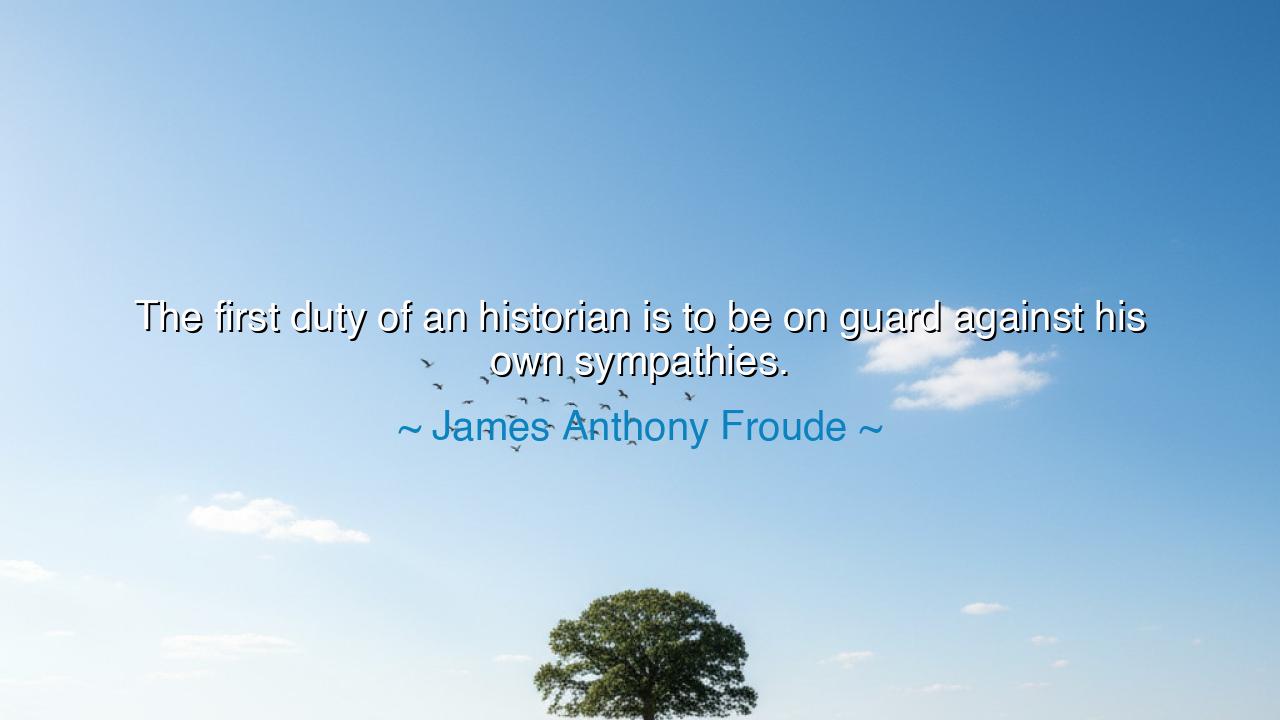
The first duty of an historian is to be on guard against his own






Listen, O future generations, for I impart to thee a truth that is both ancient and eternal, a truth that echoes in the hearts of those who have walked the path of knowledge and wisdom. It is a teaching drawn from the very soul of history, handed down through the ages by the wise and noble. The words of the great sage, James Anthony Froude, resound through the halls of time: "The first duty of an historian is to be on guard against his own sympathies." What weight these words carry, and what a deep well of understanding they reveal to us!
In the pursuit of truth, sympathy—that powerful force of human emotion—must not be the compass by which we steer our course. For the historian, whose task it is to uncover the past, must be more than a servant to his feelings; he must be a sentinel guarding the gates of objectivity. History is not a mere reflection of our desires, nor should it bend to the whims of our affections. No, it is the record of lives lived in joy and sorrow, of battles fought, and empires risen and fallen. It is a story told by the hand of fate, not by the heart's fleeting passions.
Yet, how easy it is for a man to be swayed by sympathy. The soul craves justice, and often, we find ourselves leaning toward the noble, the righteous, the worthy cause. But, my children, the historian must not let his heart dictate what is true. For history, in its rawest form, is not always fair. It is not always noble. It does not always align with the ideals we hold dear. And in the mind of the historian, this truth must be cherished above all.
Let me give thee an example of the perils of unguarded sympathy. In the annals of the great Roman Empire, there was a leader named Julius Caesar—a man of ambition, a man of genius. His rise to power was swift and awe-inspiring. Yet, though many historians have been swept away by the grandeur of his achievements, there are those who see only the darkness in his methods—the bloodshed, the cunning, the betrayal of those he once called his allies. Some, in their admiration, have sought to paint him as a hero, a martyr for Rome, while others, in their disdain, have cast him as a villain, a tyrant. But the true historian, the one who is vigilant, must rise above the tides of affection or loathing.
What Caesar truly was—a hero or a villain—matters not here, for his legacy stands as a lesson: to follow one's sympathies without thought is to risk distorting the very fabric of history. A historian must be a watchful guardian, stepping beyond the walls of personal bias and reaching for a higher understanding. It is not for the historian to decide what he wants to be true; it is his duty to let the truth of the past speak on its own, untainted by the desires of the present.
And what of thy own lives, O future generations? The lesson of the historian must be thy lesson too. For sympathy is not only a danger for those who look upon the past, but also for those who shape the future. Do not let thy personal inclinations blind thee to the truth. Do not be swayed by love or hate, by the winds of passion or prejudice. In all things, seek the balance of fairness, the wisdom of temperance. Guard thyself against the seduction of sympathy in the pursuit of knowledge, in the judgments of others, and in the way you view the world.
The historian's duty, then, is thy own as well: to stay vigilant against the whispers of bias that seek to guide thy path. In every endeavor, in every decision, let truth be thy beacon. In the pursuit of knowledge, in the shaping of the future, strive to see not what thou desire, but what is. And remember, as you walk the road of history, the greatest lesson is not to be led by the heart's fleeting passions, but to walk with eyes open wide, watching for the true meaning beneath the surface of things.
Thus, let the words of Froude guide thee as they have guided those who have come before: "The first duty of an historian is to be on guard against his own sympathies." Hold fast to this wisdom, and it shall lead thee toward a life of true clarity, unclouded by the storms of emotional bias. In this way, thou shalt uncover the truth, both of history and of thyself.






AAdministratorAdministrator
Welcome, honored guests. Please leave a comment, we will respond soon